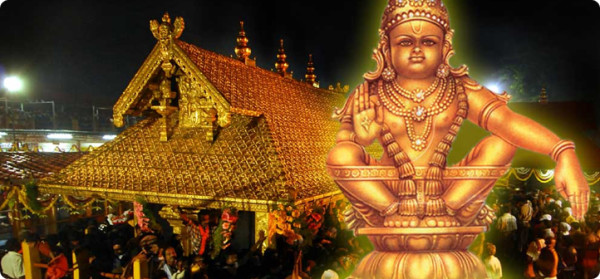A petition challenging the practice of restricting the entry of women into the Sabrimala temple in Kerala has caught the attention of the entire country. The PIL has sought entry for all women and girls in the temple. The apex court, on January 11, had questioned the age-old tradition of banning entry of women of menstrual age group in the temple saying this cannot be done under the Constitution.
The matter will be heard on February 8. While it will be interesting to see how the case unfolds in court, a look into the legend behind this age-old tradition is equally worthwhile. A walk through the history behind Sabarimala’s relevance and the faith of its thousands of devotees unveils some interesting facets regarding the beliefs held by the pilgrims and the equality in caste and religion that it promotes.
Interestingly, even if the court lifted the restrictions, women who believe in the deity will not be lining up to visit the highly revered Ayappa.
Who is Ayappa?
A historical figure, Ayappa was the prince of a small kingdom called Panthalam. Located in the Patthanamthitta district in Kerala, the palace he was brought up in still exists. Apart from the historical aspects, there is another popular legend regarding Ayappa.
According to puranic history, Ayappa is the son of Vishnu and Shiva – a result of a union of their forces and is believed to possess traits of both gods, making him a potent deity in the eyes of his devotees.
The Babar connection
Babar, whom prince Ayappa defeated in battle, was one of his most loyal subjects. In fact, Babar (Vavar in Malayalam) is still believed to be present in spirit at a mosque in Erumeli. Believers feel Vavar protects pilgrims who make the difficult 40-km trek through the woods to the main temple on top of the hill. So, besides the hordes of visitors that throng the Sabarimala temple, Muslims too undertake a journey to the mosque at Erumeli and the Vavar shrine, which faces the temple on the hill-top.
Breaking barriers
Sabarimala is believed to be an essence of inclusiveness and openly welcomes people of all faiths and castes. There are no caste-based restrictions on people visiting the Sabarimala temple. Devotees are uniformly dressed in black. Besides signifying a renunciation of all worldly pleasures, it also underlines that everyone is equal before Ayappa.
The hierarchy among pilgrims is based not on caste, but on the number of times they have made the pilgrimage. Before embarking upon the journey, devotees lead a 40-day-long ascetic life and pray in groups. It is probably one of the very few instances where the prayers can even be led by a Dalit. Moreover, a Brahmin in the prayer group must still touch his feet.
Who put the restrictions in place?
Legend has it that the restrictions on women entering the temple were placed by none other than Ayappa himself. Ayappa is considered to have taken a vow of celibacy in order to focus on the prayers of his devotees. As per popular belief, his vow of celibacy will only end once kanni swamis (first-time devotees) stop visiting the Sabarimala temple.
Why restrict women?
As per Ayappa’s puranic history, his birth – through the unification of forces of Shiva and Vishnu – was destined to destroy a female demon who had a boon of life and could only be vanquished by a child born of both Shiva and Vishnu.
When Ayappa killed the demon, a beautiful woman emerged from the body. She had been cursed to live as a demon, but her killing had rid her of the curse. The woman offered Ayappa her hand in marriage, which Ayappa refused. Ayappa explained that her mission was to go to Sabarimala where he would heed to the prayers of his devotees.
Ayappa then assures her that he will marry her when kanni-swamis stop visiting Sabarimala. The woman continues to sit and wait for him at a neighbouring shrine near the main temple and is worshipped as Malikapurathamma.
And that is why women do not go to Sabarimala. It is partly out of empathy for Malikapurathamma and her eternal wait besides their respect for Ayappa’s commitment to answer the prayers of his devotees.
Devotees strongly believe that since he is celibate, he should not be distracted. It is this belief that has deterred women from going to Sabarimala, and not because of menstruation or being unclean






Leave a reply